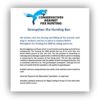Our Blue Fox Co founder Celebrated 10 successful years of the hunt ban with cross party MPs and the League Against Cruel Sports in Westminster.
Blue Fox patron Sir Roger Gale MP, president of Conservative Animal Welfare attended along with Labour MPs Chris Williamson MP and Kerry M Carthy. Libdem MP Adrian Sanders was there to support the celebrations.
Sir Roger appeared on BBC Newsnight to talk on the success of the hunt ban opposite a Countryside Alliance spokesperson.
The League Against Cruel Sports launched their new report calling for a strengthening of the Hunting Act 2004 to make it even more successful. http://www.league.org.uk/
Jail those convicted of illegal blood sports, campaigners say- The Guardian, 18th November 2014
Report marking 10th anniversary of Hunting Act calls for strengthening of law to close alleged loopholes
Hunters should face prison sentences for illegal blood sports, be banned from sending dogs underground and prevented from escaping prosecution by claiming that kills are accidental, according to animal welfare campaigners.
In a report marking the 10th anniversary on Tuesday of the passage of the Hunting Act, the League Against Cruel Sports has called for a strengthening of the law to close what it believes are loopholes in the legislation. The maximum penalty should rise from a £5,000 fine to six months in prison, it urges.
Despite promises by David Cameron before the last election that there would be a free vote for MPs to test continuing support for the act, there has been no parliamentary motion since it received royal assent on 18 November 2004.
An increase in anti-hunting Tory MPs in the 2010 intake – grouped around Conservatives Against Fox Hunting, whose motto is “Don’t run with the pack” – has ensured that there is no likelihood of repeal in this parliament.
The League’s report points out that polling by Isos/Mori last year showed that 80% of people in Britain want fox hunting to remain illegal, 85% oppose deer hunting and 87% think hare hunting and coursing should remain outlawed.
The organisation is now calling for a prohibition on the use of dogs below ground because, it argues, that is “where the worst cruelty occurs in hunting, not only to wild mammals pursued underground with limited opportunity to escape …but also to the dogs” sent down to chase out foxes or badgers.
The Hunting Act permits a maximum of two dogs to flush a fox or other quarry towards someone who will shoot it. An attempt by pro-hunting MPs earlier this year to relax restrictions on the number of dogs deployed for flushing out was abandoned before it could be brought to a vote.
The League also calls for a new clause to prevent the killing of wild mammals during a trail hunt being passed off as an “unfortunate accident”; it proposes criminalising reckless behaviour. Many hunts, the charity says, use following trails “simply as a cover for illegal hunting”.
Maximum penalties should rise so that they are comparable with other wildlife legislation, such as the Protection of Badgers Act and Wild Mammals Protection Act, according to the report. That would increase the heaviest punishment from a £5,000 fine to six months in jail.
Joe Duckworth, chief executive of the League Against Cruel Sports, said: “The Hunting Act has proven to be an effective and popular piece of legislation, with a higher number of convictions than similar wildlife laws. Public support for the prohibition of hunting has always been high, but this has also increased substantially over the past 10 years.
“Yet, since its introduction, the act has been the target of considerable attack from the pro-hunt lobby, which has waged an ongoing and concerted campaign of disinformation to publicly discredit the legislation and promote their campaign for repeal.
“The problem is not with the law. It’s with those that flout it. It is time to now build on the successes of first 10 years and strengthen the Hunting Act to ensure the spirit of the act is fulfilled.“
Figures up until the end of last year show that 527 people have been prosecuted under the act. The Countryside Alliance, which campaigns for repeal of the legislation, says 96% of those cases relate to hare coursing with dogs or other offences – not hunts. There have only been 19 convictions of hunt members.
There are more than 300 registered hunts in England and Wales. None has closed as a result of the ban, according to Tim Bonner, director of campaigns for the Alliance. A future English parliament, he said, without a large number of Scottish MPs would support repeal.
“Anti-hunting organisations spent 700 hours of parliamentary time getting their legislation onto the statute books,” Bonner said. “They are now accepting it’s a mess and want it changed. It’s a ridiculous state of affairs. The next government should scrap the Hunting Act and bring in a law that deals with wild animals.
“There has been few prosecutions [of hunts] and a big impact on police resources. The legislation is not about foxes. It’s been a political attack on a group of people. You can still kill foxes or deer.”
The Campaign to Strengthen the Hunting Act has also been launched by the organisation Protect Our Wild Animals. Philip Mansbridge, UK director of the International Fund for Animal Welfare, said: “This 10-year landmark shows clearly that hunting with dogs belongs in the history books. However, enforcement of the act is still a challenge.
“Regrettably in some cases hunters may be using trail hunting as a false alibi to allow the pursuit of a live animal which is something that we would like to see addressed.”
Hunting with a full pack of hounds remains legal in Northern Ireland. In his 2010 memoirs, Tony Blair repented supporting the act and said it was a mistake, and described it as “not one of my finest policy moments”. His office declined to comment when approached last week.
Defra, the department responsible for animal welfare legislation, does not rule out a vote before the next election. A spokesperson said: “We will bring forward a motion on a free vote enabling the House of Commons to express its view on the repeal of the Hunting Act, when parliamentary time allows.”







